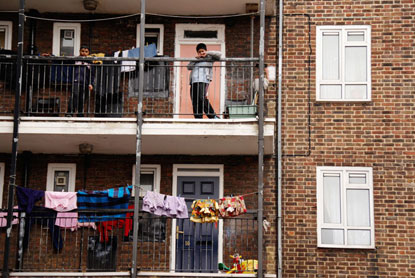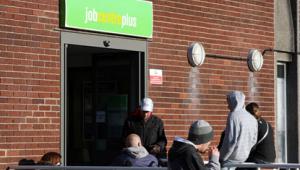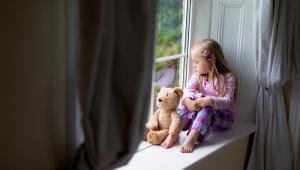By Richard Johnstone | 4 January 2012
Planned changes to the tax and benefit system will hit the incomes of families with children hardest and increase child poverty, according to the Institute for Fiscal Studies.
 In a study of the changes in November’s Autumn Statement, the economic think-tank concludes that families will
be affected more than pensioners or adults without children.
In a study of the changes in November’s Autumn Statement, the economic think-tank concludes that families will
be affected more than pensioners or adults without children.Chancellor George Osborne announced that he would increase the child element of the Child Tax Credit by £135 in line with inflation from April. But he scrapped plans for an additional £110 above-inflation rise in the child element and froze the Working Tax Credit.
Overall, median income among families with children will fall by 4.2% between 2010 and 2015, largely due to benefit changes, the IFS report found. For a couple with two children, this equates to £1,250 less a year by 2015.
The study, carried out for the Family and Parenting Institute, found that this would increase child poverty through to 2014/15, with families in the poorest tenth of the population being around 10% worse off.
Echoing its previous warnings, the IFS estimates that around 500,000 more children will fall into absolute poverty by 2015/16. This measure, as defined by the Child Poverty Act, is where family income is below 60% of the middle income in 2010/11.
More than half of these children, 300,000, will come from households where the youngest child is under five.
The IFS report, The impact of austerity measures on households with children, also examined the impact of the introduction of the Universal Credit, which will begin to merge most existing benefits from October 2013.
It found that this change would help certain family types but lone parents not in employment would be particularly disadvantaged. They would lose more than 12% of their income on average by 2014/15, or £2,000 per year.
Katherine Rake, chief executive of the Family and Parenting Institute, said: ‘These figures reveal the full extent to which families with children are shouldering the burden of austerity. Having children has always been expensive. But now many families with children face an extra penalty of more than £1,000.
‘It is particularly surprising to see that some of the most vulnerable groups – such as families with new babies and lone parents out of work – are bearing the brunt of the tax and benefit reforms. Many families will be left struggling to understand why they have been singled out in this way and how this sits alongside the government’s ambition for the UK to become a family-friendly nation.’
Responding, the government said that it was relieving the burden for families by cutting fuel duty, freezing council tax and raising the income tax threshold. A government spokesman added: ‘The chancellor also confirmed working-age benefits will go up by 5.2% in April and increased the child element of the Child Tax Credit in line with inflation.’
The spokesman also said that the Universal Credit would give almost 3 million households a higher level of entitlement than at present and would help families take up entitlements that are currently unclaimed.
However, Yvette Cooper, Labour’s shadow home secretary and shadow minister for women and equalities, said the report was a ‘damning verdict’ on the government’s policies.
‘It shows that families with children are being hit more than four times harder than the average household and it leaves David Cameron’s promise to be a family-friendly government in tatters.’





















